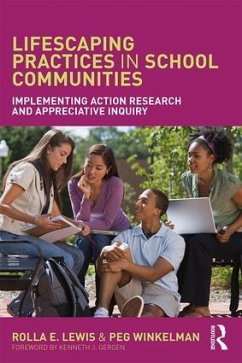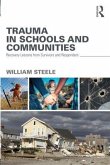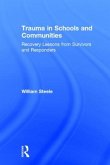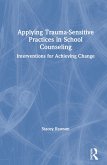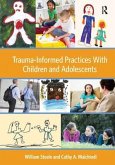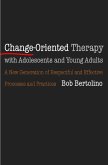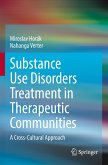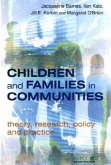Rolla E. Lewis, Peg Winkelman
Lifescaping Practices in School Communities
Implementing Action Research and Appreciative Inquiry
Rolla E. Lewis, Peg Winkelman
Lifescaping Practices in School Communities
Implementing Action Research and Appreciative Inquiry
- Broschiertes Buch
- Merkliste
- Auf die Merkliste
- Bewerten Bewerten
- Teilen
- Produkt teilen
- Produkterinnerung
- Produkterinnerung
Lifescaping Practices in School Communities is a guide for school administrators and helping professionals (school counselors, school psychologists, school social workers, and other stakeholders) looking to promote relational wellness and student success in their school. This informative new resource will introduce readers to an ecological approach by using action research and appreciative inquiry to guide and engage school-wide change. Also offered are first-hand models of conceptual lifescaping projects using action research and appreciative inquiry by first-time practitioners from different school communities.…mehr
Andere Kunden interessierten sich auch für
![Trauma in Schools and Communities Trauma in Schools and Communities]() William SteeleTrauma in Schools and Communities59,99 €
William SteeleTrauma in Schools and Communities59,99 €![Trauma in Schools and Communities Trauma in Schools and Communities]() William SteeleTrauma in Schools and Communities238,99 €
William SteeleTrauma in Schools and Communities238,99 €![Applying Trauma-Sensitive Practices in School Counseling Applying Trauma-Sensitive Practices in School Counseling]() Stacey RawsonApplying Trauma-Sensitive Practices in School Counseling216,99 €
Stacey RawsonApplying Trauma-Sensitive Practices in School Counseling216,99 €![Trauma-Informed Practices With Children and Adolescents Trauma-Informed Practices With Children and Adolescents]() William SteeleTrauma-Informed Practices With Children and Adolescents248,99 €
William SteeleTrauma-Informed Practices With Children and Adolescents248,99 €![Change-Oriented Therapy with Adolescents and Young Adults: The Next Generation of Respectful Processes and Practices Change-Oriented Therapy with Adolescents and Young Adults: The Next Generation of Respectful Processes and Practices]() Bob BertolinoChange-Oriented Therapy with Adolescents and Young Adults: The Next Generation of Respectful Processes and Practices36,99 €
Bob BertolinoChange-Oriented Therapy with Adolescents and Young Adults: The Next Generation of Respectful Processes and Practices36,99 €![Substance Use Disorders Treatment in Therapeutic Communities Substance Use Disorders Treatment in Therapeutic Communities]() Miroslav HorákSubstance Use Disorders Treatment in Therapeutic Communities81,99 €
Miroslav HorákSubstance Use Disorders Treatment in Therapeutic Communities81,99 €![Children and Families in Communities Children and Families in Communities]() Jacqueline BarnesChildren and Families in Communities194,99 €
Jacqueline BarnesChildren and Families in Communities194,99 €-
-
-
Lifescaping Practices in School Communities is a guide for school administrators and helping professionals (school counselors, school psychologists, school social workers, and other stakeholders) looking to promote relational wellness and student success in their school. This informative new resource will introduce readers to an ecological approach by using action research and appreciative inquiry to guide and engage school-wide change. Also offered are first-hand models of conceptual lifescaping projects using action research and appreciative inquiry by first-time practitioners from different school communities.
Hinweis: Dieser Artikel kann nur an eine deutsche Lieferadresse ausgeliefert werden.
Hinweis: Dieser Artikel kann nur an eine deutsche Lieferadresse ausgeliefert werden.
Produktdetails
- Produktdetails
- Verlag: Routledge
- Seitenzahl: 272
- Erscheinungstermin: 17. November 2016
- Englisch
- Abmessung: 229mm x 152mm x 15mm
- Gewicht: 399g
- ISBN-13: 9781138209480
- ISBN-10: 1138209481
- Artikelnr.: 47177219
- Herstellerkennzeichnung
- Libri GmbH
- Europaallee 1
- 36244 Bad Hersfeld
- gpsr@libri.de
- Verlag: Routledge
- Seitenzahl: 272
- Erscheinungstermin: 17. November 2016
- Englisch
- Abmessung: 229mm x 152mm x 15mm
- Gewicht: 399g
- ISBN-13: 9781138209480
- ISBN-10: 1138209481
- Artikelnr.: 47177219
- Herstellerkennzeichnung
- Libri GmbH
- Europaallee 1
- 36244 Bad Hersfeld
- gpsr@libri.de
Rolla E. Lewis, EdD, NCC, is professor emeritus in Educational Psychology at California State University, East Bay (CSUEB). His current research and scholarly interests include public education advocacy, school counseling program development, mentoring participatory leaders, and sharing action research practices using the participatory inquiry process as lifescaping in schools. Dr. Lewis has published numerous chapters, articles, and poems in books, peer-reviewed journals, and other professional publications. He is the recipient of the Oregon Counseling Association's Leona Tyler Award for outstanding contributions to professional counseling. Peg Winkelman, PhD, is a Professor and Chair in the Department of Educational Leadership at California State University, East Bay (CSUEB). She has also taught in schools of education at the University of California, Berkeley, Mills College, and Saint Mary's College of California. She is past president of the California Association of Professors of Educational Administration. Her publications focus on her commitment to collaborative inquiry and scholar-practitioner leadership for social justice.
List of Illustrations List of Change Activities Notes on Contributors
Foreword Kenneth J. Gergen Acknowledgements Introduction Part I: Action
Research as a Participatory and an Appreciative Inquiry Process: Continuous
Dialogue and Action in School Communities 1. Eco-Relational Lifescaping in
Schools 2. Relational Ecosystems and Learning Power in Schools 3. Nurturing
Growth Narratives in School Communities 4. The Participatory Inquiry
Process (PIP) 5. Appreciative Inquiry (AI) and the 4-R Process Part II:
Lifescaping as Future Forming: From an Appreciative Inquiry Approach to
Enacting the Participatory Inquiry Process Introduction to Part II
6.Developing Relational Connections to Initiate Conversations and Identify
Challenges 7. Using Relational Dialogues to Nurture Engaged Inquiry 8.
Pursuing Relational, Collaborative Action 9. Practicing Relational,
Community Assessment and Reflection Part III: Lifescaping in Action: Told
in Participatory Inquiry Process (PIP) and AI 4-R Phases By Student
Advocates in Schools Introduction to Part III 10. A Write Way Intervention:
Successful Transitions into the Ninth Grade Molly Griffin 11. Advocating
with Appreciative Inquiry (AI) Lisa Maibaum 12. High School to Community
College Transition Group Katie Messina 13. Algebra as a Civil Right:
Increasing Achievement Through Participatory Action Research and
Appreciative Inquiry Lisa Davies 14. Conclusion: Bringing AI and PIP
Together Websites Appendix A: Professional Competencies and Ethics Appendix
B: An Ecological Model (School Counselors) Appendix C: Promoting Vital
Engagement and Eco-Relational Change Appendix D: Data Templates Appendix E:
Core Needs Assessments Appendix F: Generic Parent Permission FormAppendix
G: Mapping the Driving and Restraining Forces (MDRF) Appendix H: Focus
Group, Fishbowl Story Group, and Video Story Focus Group Guidelines: Roles,
Skills, Participation, and Agreements Appendix I: PIP and AI Action
Worksheet Appendix J: Outline for Writing Action Research Paper Using the
Participatory Inquiry Process (PIP) Appendix K: Write Way Support Materials
Appendix L: High School to Community College Biography Index
Foreword Kenneth J. Gergen Acknowledgements Introduction Part I: Action
Research as a Participatory and an Appreciative Inquiry Process: Continuous
Dialogue and Action in School Communities 1. Eco-Relational Lifescaping in
Schools 2. Relational Ecosystems and Learning Power in Schools 3. Nurturing
Growth Narratives in School Communities 4. The Participatory Inquiry
Process (PIP) 5. Appreciative Inquiry (AI) and the 4-R Process Part II:
Lifescaping as Future Forming: From an Appreciative Inquiry Approach to
Enacting the Participatory Inquiry Process Introduction to Part II
6.Developing Relational Connections to Initiate Conversations and Identify
Challenges 7. Using Relational Dialogues to Nurture Engaged Inquiry 8.
Pursuing Relational, Collaborative Action 9. Practicing Relational,
Community Assessment and Reflection Part III: Lifescaping in Action: Told
in Participatory Inquiry Process (PIP) and AI 4-R Phases By Student
Advocates in Schools Introduction to Part III 10. A Write Way Intervention:
Successful Transitions into the Ninth Grade Molly Griffin 11. Advocating
with Appreciative Inquiry (AI) Lisa Maibaum 12. High School to Community
College Transition Group Katie Messina 13. Algebra as a Civil Right:
Increasing Achievement Through Participatory Action Research and
Appreciative Inquiry Lisa Davies 14. Conclusion: Bringing AI and PIP
Together Websites Appendix A: Professional Competencies and Ethics Appendix
B: An Ecological Model (School Counselors) Appendix C: Promoting Vital
Engagement and Eco-Relational Change Appendix D: Data Templates Appendix E:
Core Needs Assessments Appendix F: Generic Parent Permission FormAppendix
G: Mapping the Driving and Restraining Forces (MDRF) Appendix H: Focus
Group, Fishbowl Story Group, and Video Story Focus Group Guidelines: Roles,
Skills, Participation, and Agreements Appendix I: PIP and AI Action
Worksheet Appendix J: Outline for Writing Action Research Paper Using the
Participatory Inquiry Process (PIP) Appendix K: Write Way Support Materials
Appendix L: High School to Community College Biography Index
List of Illustrations List of Change Activities Notes on Contributors
Foreword Kenneth J. Gergen Acknowledgements Introduction Part I: Action
Research as a Participatory and an Appreciative Inquiry Process: Continuous
Dialogue and Action in School Communities 1. Eco-Relational Lifescaping in
Schools 2. Relational Ecosystems and Learning Power in Schools 3. Nurturing
Growth Narratives in School Communities 4. The Participatory Inquiry
Process (PIP) 5. Appreciative Inquiry (AI) and the 4-R Process Part II:
Lifescaping as Future Forming: From an Appreciative Inquiry Approach to
Enacting the Participatory Inquiry Process Introduction to Part II
6.Developing Relational Connections to Initiate Conversations and Identify
Challenges 7. Using Relational Dialogues to Nurture Engaged Inquiry 8.
Pursuing Relational, Collaborative Action 9. Practicing Relational,
Community Assessment and Reflection Part III: Lifescaping in Action: Told
in Participatory Inquiry Process (PIP) and AI 4-R Phases By Student
Advocates in Schools Introduction to Part III 10. A Write Way Intervention:
Successful Transitions into the Ninth Grade Molly Griffin 11. Advocating
with Appreciative Inquiry (AI) Lisa Maibaum 12. High School to Community
College Transition Group Katie Messina 13. Algebra as a Civil Right:
Increasing Achievement Through Participatory Action Research and
Appreciative Inquiry Lisa Davies 14. Conclusion: Bringing AI and PIP
Together Websites Appendix A: Professional Competencies and Ethics Appendix
B: An Ecological Model (School Counselors) Appendix C: Promoting Vital
Engagement and Eco-Relational Change Appendix D: Data Templates Appendix E:
Core Needs Assessments Appendix F: Generic Parent Permission FormAppendix
G: Mapping the Driving and Restraining Forces (MDRF) Appendix H: Focus
Group, Fishbowl Story Group, and Video Story Focus Group Guidelines: Roles,
Skills, Participation, and Agreements Appendix I: PIP and AI Action
Worksheet Appendix J: Outline for Writing Action Research Paper Using the
Participatory Inquiry Process (PIP) Appendix K: Write Way Support Materials
Appendix L: High School to Community College Biography Index
Foreword Kenneth J. Gergen Acknowledgements Introduction Part I: Action
Research as a Participatory and an Appreciative Inquiry Process: Continuous
Dialogue and Action in School Communities 1. Eco-Relational Lifescaping in
Schools 2. Relational Ecosystems and Learning Power in Schools 3. Nurturing
Growth Narratives in School Communities 4. The Participatory Inquiry
Process (PIP) 5. Appreciative Inquiry (AI) and the 4-R Process Part II:
Lifescaping as Future Forming: From an Appreciative Inquiry Approach to
Enacting the Participatory Inquiry Process Introduction to Part II
6.Developing Relational Connections to Initiate Conversations and Identify
Challenges 7. Using Relational Dialogues to Nurture Engaged Inquiry 8.
Pursuing Relational, Collaborative Action 9. Practicing Relational,
Community Assessment and Reflection Part III: Lifescaping in Action: Told
in Participatory Inquiry Process (PIP) and AI 4-R Phases By Student
Advocates in Schools Introduction to Part III 10. A Write Way Intervention:
Successful Transitions into the Ninth Grade Molly Griffin 11. Advocating
with Appreciative Inquiry (AI) Lisa Maibaum 12. High School to Community
College Transition Group Katie Messina 13. Algebra as a Civil Right:
Increasing Achievement Through Participatory Action Research and
Appreciative Inquiry Lisa Davies 14. Conclusion: Bringing AI and PIP
Together Websites Appendix A: Professional Competencies and Ethics Appendix
B: An Ecological Model (School Counselors) Appendix C: Promoting Vital
Engagement and Eco-Relational Change Appendix D: Data Templates Appendix E:
Core Needs Assessments Appendix F: Generic Parent Permission FormAppendix
G: Mapping the Driving and Restraining Forces (MDRF) Appendix H: Focus
Group, Fishbowl Story Group, and Video Story Focus Group Guidelines: Roles,
Skills, Participation, and Agreements Appendix I: PIP and AI Action
Worksheet Appendix J: Outline for Writing Action Research Paper Using the
Participatory Inquiry Process (PIP) Appendix K: Write Way Support Materials
Appendix L: High School to Community College Biography Index

